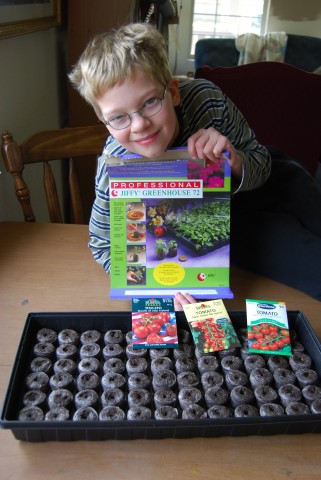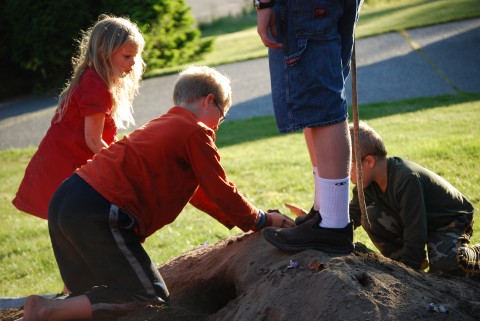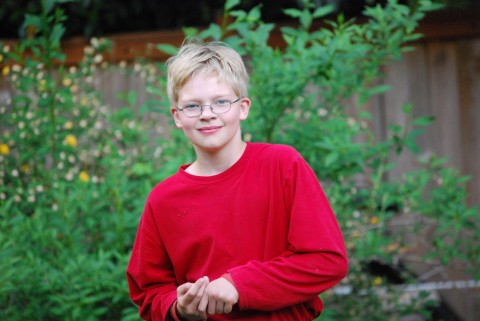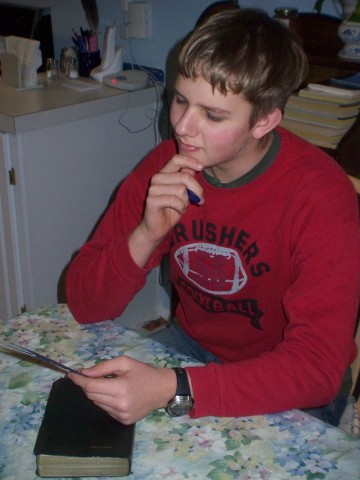 It can be rather difficult (at least over the long haul) to be a parent to five children. In spite of their shared genetic and environmental heritage, each of my children has been very stubborn about asserting their individuality. Just when I find a parenting technique that ‘works’ with one child, along comes another, totally different. It just doesn’t seem fair.
It can be rather difficult (at least over the long haul) to be a parent to five children. In spite of their shared genetic and environmental heritage, each of my children has been very stubborn about asserting their individuality. Just when I find a parenting technique that ‘works’ with one child, along comes another, totally different. It just doesn’t seem fair.
Fortunately, I’m blessed with a wife who assiduously devours parenting resources of all kinds. She reads books about child-rearing. She listens to parenting CDs and watches parenting DVDs. She reads magazine articles about child psychology. She even (gasp!) reads blogs about training and nurturing our offspring. Then she likes to bounce the various philosophies off me.
“I read the neatest parenting blog today,” she’ll enthuse. “They have some really good ideas … I’d like to talk with you about it some time this evening.”
“Um, OK … great!” I temporize. Rapidly, I switch into Supportive Homeschool Dad™ mode, which requires a cape, but fortunately, no spandex tights. (My apologies to those who are wincing at the image conjured up by my use of the phrase, ‘spandex tights’.) Mentally, I brace myself, because it usually takes a couple of hours to wring the maximum benefit out of each new discovery. As a homeschooling mother of five, Kathy is pretty immersed in parenting, and she takes it very seriously (in a fun way, of course).
One interesting concept we’ve encountered along the way, is the idea of ‘tomato staking’, as discussed in L. Elizabeth Kruger’s recently published book. (Actually, we haven’t read the book; Kathy gleaned this information off her website and discussion forum, known whimsically as The Woodshed.)

Daniel was very excited to be appointed Keeper of the Peat.
The basic idea is that as a parent, you should keep your children close to you, training them and correcting them as necessary, building them into godly young men and women. One problem Kathy and I encounter is that when a child comes to our negative attention, we tend to punish-and-isolate — that is, we send the offending child away as a result of their sin. “They need time to pray and ask God for forgiveness,” we rationalize. “Or at least if they’re going to sulk, they should do it where no one else has to pay the price.” But the truth is sometimes more sinister: we’re still angry at the child’s conduct (or they’re mad at us) and we’d rather not be around them.
Kruger suggests (and my sweet Kathy agrees) that it might be better to keep an offending child under close supervision (within a few feet) rather than sending them off to wreak more havoc. Some children, when corrected by Mom or Dad, will take out their anger and frustration on a sibling, if left to their own devices. Others will sulk in their rooms like Achilles in his tent, which rarely produces repentance or a positive change in behavior.
I’m afraid I’m over-simplifying, but another facet is a bit more proactive. “Why wait ’til your child gets in trouble,” proponents of this philosophy would ask. “Keep ‘em close and train ‘em up right, while they are still young.” Tomato staking has to do with spending lots of time in close proximity to children, teaching them in those more tractable moments, rather than abdicating their training to other influences, however worthy.

Painstakingly, we planted each of the peat disks with two seeds …
On Saturday, Daniel and I took Kathy’s van to Wal-Mart to get its oil changed, long overdue. While we were there, we browsed the garden center, since Daniel and I are full of money-making and money-saving schemes that have to do with growing things. We happened upon a cool seed-starter kit, and decided to grow our own tomato plants this year, instead of buying them from the local hardware store at $4 a pot. For about $10, we acquired enough seeds and little peat disks to start 72 seedlings.
We had a great time, when we got home, preparing the peat (it’s amazing how they soak up the water!) and planting the seeds. Now they’re under Daniel’s bed waiting ’til they sprout — we’re hoping to have enough surviving plants to generate a good, healthy crop this year. Kathy and I eat a lot of tomatoes, and they are not particularly cheap, even in season. Last year we garnered a decent crop, in spite of the cursed deer who ate the tops of most of my plants.

Not our actual tomato harvest … sigh.
If you’ve ever grown tomatoes, you know that one of the main problems is keeping the vines up off the ground long enough for the fruit to ripen. Left to its own devices, a tomato plant will refuse to stand up tall, but will rather allow its branches to sprawl untidily across the ground. As the tomatoes grow on the vine, they are prone to rot and damage because of their contact with the ground. Small children who are sent out to water the plants routinely step on the fruit, and insects seem to delight in more convenient access to the crop. Sometimes the plants will start out with good upright posture, but when the weight of the tomatoes increases, the vines are bent and even broken. This seems especially likely in times of drought, when the branches weak and prone to be brittle.

Sarah and David could hardly stand being left out of this project.
Some gardeners put wooden stakes alongside their plants, and use plastic ties to affix the branches to the stake. Others surround their plants with metal mesh towers, training and supporting the vines as they grow upward. Either way, the intent is to guide and protect the vines, holding them to an upright standard. Kruger argues that parents who share their lives with their children perform a similar moral and spiritual function, fulfilling the instruction in Deuteronomy 6:6-9:
These commandments that I give you today are to be upon your hearts. Impress them on your children. Talk about them when you sit at home and when you walk along the road, when you lie down and when you get up. Tie them as symbols on your hands and bind them on your foreheads. Write them on the doorframes of your houses and on your gates.

A basic tomato stake.
It was a good day. When my children are filled-up with time with me or with Kathy, their whole outlook on life seems to improve. They tend to be more trusting of my heart, and more submissive to correction. They are much more apt to be patient and kind, and often will serve with a more willing spirit. The only cost is my time, which is not so bad, since I really like being around my children when they are cheerful.

Some tomatoes are so fierce, you have to put them in cages.
Tomato staking is a good word picture for the way that we try to infuse our children with the best of our wisdom, discipline and love for God. Thinking of how Jesus worked with his disciples, and how God works in my life, it seems a good word picture for more than just parenting. How many times have I chafed at being trained to the standard as the Gardener binds my life to His stake through the Word and the ministry of the Holy Spirit?
I am the vine; you are the branches. If a man remains in me and I in him, he will bear much fruit; apart from me you can do nothing. If anyone does not remain in me, he is like a branch that is thrown away and withers; such branches are picked up, thrown into the fire and burned. If you remain in me and my words remain in you, ask whatever you wish, and it will be given you. This is to my Father’s glory, that you bear much fruit, showing yourselves to be my disciples. — John 15:5-8
Tim
Project 366, retroactive, Day 82
L. Elizabeth Kruger’s book, Raising Godly Tomatoes, is available on her website for a discounted price of $14.95. Please mention that you read about it here — we’d like to build some credibility so we can, in the future, get a further discount for our readers.
Related posts:

























